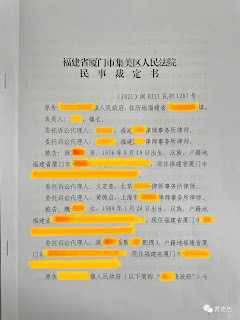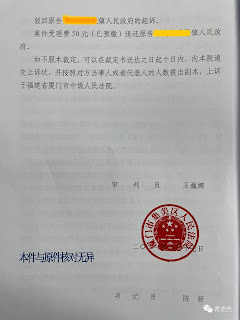 |
|
Jimei District People’s Court verdict, first page.
(Photo: Attorney Huang Qide’s WeChat)
|
(Xiamen City, Fujian Province —August 23, 2021) On August 17, the Jimei District People’s Court announced the verdict for the first trial of the case involving the education of the children of a Christian couple, You Chuandao and his wife. This court rejected the request by the Chinese Communist Party (CCP) in the case filed by Xiamen City, Fujian Province in which authorities had requested that the Brother You couple send their children to public school. This second such suit involving Christian education follows the case of Fan Ruzhen,* a Christian mother in Beihai.
Attorney Huang Qide, Brother You’s representative, posted the court’s verdict on independent media. He stated:
My client granted permission for the verdict of the first trial of the case to be publicized for the purpose of research only, not to hype the case up. As this personal stance does not depict one of an institute, therefore, we removed the name of the litigant and the law firm.
Brother You and his wife have home schooled their two daughters, born in 2005 and 2007, in their “hukou” [registered permanent residence] recorded in Xiamen City. In 2018, when the Fujian Province Department of Education developed a database of the demographics and education of the poor, they discovered that the two children of Brother You were not enrolled in school. On December 29, 2018, Provincial Education Supervision Office informed Xiamen Municipal Department of Education of the two out-of-school children. Xiamen Municipal Department of Education then advised Xiamen City officials, and elementary school leaders. After learning this information, these two institutions investigated and confirmed that Brother You’s family frequently resides in Xiamen City.
Although multiple officials from the town government, Xiamen Municipal Department of Education, Xiamen Elementary School, and Xiamen Middle School visited Brother You and his wife, the couple continued to refuse to send their children to public school for the CCP’s compulsory education. Ultimately, Xiamen officials sued Brother You and his wife, claiming that the couple violated the People’s Republic of China, Article 4, Compulsory Education Law. In the Xiamen’s lawsuit to Jimei District People’s Court, officials requested that the court order the You couple to send their children to public school to complete the CCP’s 9-year compulsory education.
The You couple defended themselves, stating:
I. It is an erroneous application of law that Xiamen officials filed the civil prosecution pursuant to Compulsory Education Law of the People’s Republic of China, Article 58.
i. Rather than file a civil complaint, Xiamen officials assert that the You couple did not fulfill their legal obligation, and that they should enforce this law themselves, pursuant to Administrative Enforcement Law of the People’s Republic of China or ask the court to enforce it. Compulsory Education Law of the People’s Republic of China, Article 58, states:
If parents or other legitimate custodians do not comply with the law and send children of the age and teenagers to school and let them receive compulsory education without an appropriate reason, the local government of the town or village or the county government should reproach them and educate them and ask them to rectify before a [designated] deadline.” Instead of the civil right, the town government has administrative power to “reproach, educate and order people to rectify before a deadline.” Reproaching and educating are administrative penalty, and ordering people to rectify before a deadline is the administrative protocol.
According to Administrative Enforcement Law of the People’s Republic of China, Article 34:
the administrative organ having power to carry out administrative enforcement can enforce it when the litigant does not fulfil the obligation before the deadline issued by the administrative organ after the administrative organ makes an administrative decision in accordance with law, and
According to Article 53:
the administrative organ that doesn’t have power to enforce it can ask People’s Court to enforce it pursuant to the regulation within three months starting the deadline if the litigant does not apply for administrative review nor implement the administrative decision within the statutory time limit, town government should use the administrative enforcement protocol rather than file a civil complaint to the court and seek private aid by changing the concept, switching power to right and voluntarily descending to a “victim.”
ii. Town government is the unsuitable litigant in the case about the dispute over custody even if a civil lawsuit is filed. The court regards the case as a dispute over custody. Pursuant to Civil Code of the People’s Republic of China, Article 36:
People’s Court can revoke a custodian’s qualification, arrange the temporary indispensable custody measures, and designate a custodian according to the principle of being most beneficial to the person under guardian if the custodian shows one of following situations …The individuals and organizations involved in the article include:
other people who legitimately have custody qualifications, resident committee, village committee, school, medical institution, Women Federation, Disabled Persons’ Federation, Protection of Minors organizations, seniors’ organizations founded legitimately, department of civil affairs and etc. Therefore, the organization which have right to file a lawsuit over custody to People’s Court in order to protect the person under guardian doesn’t include government of county and town. Pursuant to Civil Procedure Law of the People’s Republic of China, Article 119, the plaintiff should be citizen, artificial person and other organization directly related to the case. Town government and the You couple are not interest parties with regards to the civil procedure about custody, so town government is an unsuitable litigant.
II. Town government has no legal evidence and facts supporting their conclusion that You Chuandao’s two children do not attend school nor receive compulsory education and are out-of-school.
i. Compulsory education is not equal to public education, 1. Receiving compulsory education does not mean attending public school. Pursuant to Law of the P.R.C. on the Promotion of Privately-run Schools, Article 2, compulsory education can be provided by schools run by non-government organizations or individuals which do not belong to state organs. Compulsory Education Law of the People’s Republic of China, Article 12, states that parents are obligated to send children to schools and let them complete compulsory education, but Article 14 says:
self-providing compulsory education should be approved by Department of Education of the county government.
Thereby,
1. public school is not the mere legal option for children of the age to complete compulsory education, and parents can provide compulsory education to children.
2. The current compulsory education is not equal to forcible education. The Constitution stipulates citizens are obligated to receive education, but obligation should not be coercion. Rather, it should be to ensure children education.
3. The You couple, as parents, has the right to choose how and where their children receive education. Parents’ education right is the core of paternity, Civil Code of the People’s Republic of China, Article 1058, says that husband and wife equally and mutually share the right and obligation of raising, educating, and protecting underage children. Parents’ education right is primarily manifested in that they decide upon what and how children are educated according to their world views, values, and religions and the couple is the suitable litigant. They have the right to choose where children receive and participate in education.
4. The You couple arranges home school for two children, which is the true wish of two children, so parents or government should respect their wish.
5. The oldest daughter is over 15 years old and not in the age range for compulsory education.
6. Town government’s lawsuit is against the essence of education, increases citizens’ burden, and makes trouble to the court’s enforcement.
ii. Their two children are not out of school; the You couple has provided them education which is as good as or even better than education children of the age receive at public schools and fulfills the custodian’s education obligation. The elementary education of You Chuandao’s two daughters started in 2012 and 2014, subjects include Chinese, math, English, history, art, PE, science, music, and character education, and at this point their education has been going smoothly. To sum up, it is erroneous application of law that town government files the civil lawsuit, the defendant does not violate Compulsory Education Law of the People’s Republic of China, Article 58 about the custodian’s education obligation, so we ask the court to reject the plaintiff’s request for appeal.
Reject the prosecution by the plaintiff—town government. The processing fee, 50 yuan, will be refunded to the plaintiff. If the plaintiff does not agree with the verdict, the plaintiff may appeal to the court within 10 days; starting with the verdict. The plaintiff may appeal to Fujian Province Xianmen Municipal Intermediate People’s Court and submit copies according to the number of the counterpart litigant or representatives.
 |
| Jimei District People’s Court verdict, last page. (Photo: Attorney Huang Qide’s WeChat) |
On October 5, 1998, Qin Huasun, a permanent Representative of China to the United Nations (UN), signed the International Covenant on Civil and Political Rights at the UN headquarters on behalf of Chinese government, Article 18 Clause 4 acknowledges parents’ education right:
The States Parties to the present Covenant undertake to have respect for the liberty of parents and, when applicable, legal guardians to ensure the religious and moral education of their children in conformity with their own convictions”. International Covenant on Economic, Social and Cultural Rights sanctioned by Chinese government in 2001, Article 3 says, “respect the liberty of parents and legitimate guardians: choose schools which are not public but meet the lowest education standards given or approved by the state for their children and ensure the religious and moral education of their children in conformity with their own convictions”. Chinese government has promised to multiple international organizations that parents have education sovereign rights, but they violate their own promise again and again.
Attorney Zhang Peihong, a fellow Christian, commented:
Common sense shows that we must pull through tough prosecution before we gain one point by “a narrow squeak.”**
Mother faces court for choosing Christian schooling
~ Yu Bing, ChinaAid Special Reporter
ChinaAid Media Team
Cell: +1 (432) 553-1080 | Office: +1 (432) 689-6985 | Other: +1 (888) 889-7757
Email: [email protected]
For more information, click here